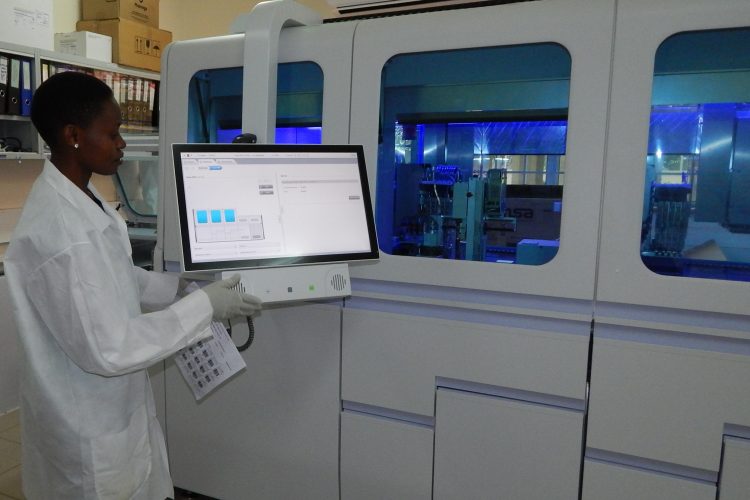Biotechnology Programme

About the programme
Its objective is to promote, harness and apply biotechnology for the discovery and development of tools and strategies for use in medicine and health care that includes Vaccine development; Diagnostics; Genetic Engineering; Bioinformatics, among others.This programme promotes, and applies Biotechnology for the discovery and development of tools and strategies for use in medicine and healthcare. The main project areas include; development of vaccines, diagnostics, genetic engineering and bioinformatics.
Today science is changing rapidly and becoming more complex, so no single researcher or single site can bring all the expertise together to develop and validate medical innovations or to ensure their efficacy. It is in this context KEMRI in collaboration with Centers for Disease Control and Prevention are conducting an Antibody Mediated Prevention (AMP) study in Kisumu.
This is a new technology that involves giving people antibodies passively to see if they will be protected against HIV infection. Pre-clinical and early clinical trials showed that this intervention was able to neutralize many strains of HIV by 90 per cent.
The AMP study therefore offers new hope and represents an important advantage in developing an effective HIV vaccine. This procedure differs from the traditional HIV vaccine studies where people get a vaccine and researchers wait to see if their bodies will respond and make antibodies against HIV.
One of the big problems with diseases that cause fever is determining which one it is. Symptoms such as high temperature, headache, tiredness and muscle pain are common signs in many diseases. Given the change in WHO guidelines that recommended malaria testing prior to treatment, clinicians are now required to expand the scope of tests when malaria testing is negative. Therefore, there is need for efficient diagnostic equipment that can quickly determine the cause of high temperatures in patients so that appropriate treatment is administered without delay. It is out of this concern KEMRI is using a new diagnostic machine in Kisumu to help in determining the exact cause of a fever in a matter of minutes.
The relationship between KEMRI and the Walter Reed Project has had a long history of accomplishments in combating increasingly complex disease threats like Ebola, HIV, Malaria, TB and multi-drug resistant organisms.
In the process this has led to developing increasingly complex tools like whole genome sequencing and rapid diagnostic tools. Most recently the collaboration has supported The President’s Malaria initiative roll-out of national malaria quality assurance program, impacting 294 Kenyan health facilities with quality assurance training and efficiency testing for 121 officers. As a result the manufacture and development of a new portable reader for malaria parasites and blood count for use in austere environments has been initiated.
In December 2016 KEMRI started community sensitization for PFSPZ vaccine. Interested parents with children within the required age bracket of 5-12 months were consulted for consent and recruitment was done. Prior to vaccination the participants were screened and all information required obtained.
Then there was daily follow-up at home for 5 days after vaccination as part of the continuing phases of the vaccination exercise. Instead of being administered intra-muscularly, the vaccine must be given by direct venous inoculation to elicit a strong immune response. When it was given to “malaria naïve” volunteers in an earlier study in the United States using the same procedure, the PFSPZ vaccine was safe and the level of protection was high against controlled human malaria infection. This led KEMRI to test it on infants in Kenya who after losing maternal immunity are relatively closer to “malaria naïve” adults in the US and as such a higher level of protection is expected.
The PFSPZ vaccine is a promising candidate composed of aseptic radiation- attenuated sporozoites, meaning the malaria parasite is no longer able to multiply but can still elicit a response from the body’s immune system.
Deoxyribonucleic acid-though a tongue twister, is simply what we usually refer to as DNA. It’s identification laboratory is up and running at KEMRI providing DNA testing in the area of family relationship testing and forensic DNA testing. However being primarily part of a research institute, the laboratory is keen on maintaining its institutional mandate. It is therefore focused on initiating research programmes in the area of forensics as well as offering training modules to graduates.in the course of its operation the laboratory has provided DNA identification services during manager national disasters in the country. In addition, the facilities have provided capacity building for several clients among them, the National Police Service particularly the Directorate of Criminal Investigations to ensure quality investigations. Through this program over 30 DCI officers were trained on Forensic Serology and DNA Analysis and subsequently graduated at a colorful ceremony held at KEMRI Grounds and also graced by Director of Public Prosecution (DPP) Noordin Haji and Director Directorate of Criminal Investigations, George Kinoti.
Achievements
Through painstaking research, KEMRI has over a period of time developed various diagnostic kits and other health products that include: –Hepcell Rapid – A chromatographic immune-assay for direct qualitative detection of Hepatitis B.
KEMCOM Rapid – A chromatographic Immuno-assay for direct qualitative detection of HIV 1 & 2.
KEMTAQ (TAQ Polymerase kit)
KEMPAC Rapid
TBcide- A standardized disinfectant
KEMrub, a hand sanitizer
KEMpreg Rapid, a pregnancy test kit and
KEMRI Ready-to-Use Culture Media
As one of the largest biomedical institution in Africa, KEMRI will continue to provide leadership in the field of biotechnology through promotion and application of new and novel biotechnologies that will improve human health and quality of life through research in line with our mission.
